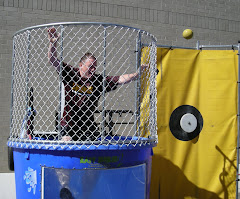Today, as I was reading Myths About Alcohol on the Adolescent Substance Abuse Knowledge Base Website, I thought the information provided was quite compelling and a message all middle school parents should hear.
Some parents breathe a sigh of relief when they find their child is "just" drinking alcohol and not using drugs, but it is a myth that alcohol is a "better" drug. Alcohol abuse, drunk driving, and alcohol-related diseases take a major toll on our society, and children who begin drinking at a young age are at much higher risk of developing problems.
Alcohol is by far the drug of choice among adolescents. It is the most used and abused mood-altering substance among pre-teens and teenaged children. Although some teens report it is easier to get illegal drugs than buy alcohol, the overall social acceptability of alcohol and the pervasive advertising that suggests alcohol creates a positive and rewarding experience often leads both teens and their parents to think drinking is simply a rite of passage with little danger over the long run. Some studies suggest that there could be as many as four million alcoholics under the age of 18, three years younger than the legal drinking age. The age when children begin drinking alcohol has decreased over the last few decades. Many children are already experimenting with alcohol in the fifth grade, many more than were just 10 years ago when teens were more likely to start drinking in eighth or ninth grade. According to the Centers for Disease Control, 40% of ninth-graders report that they tried alcohol before the age of 13 and had used alcohol within the past month.
One of the more dire consequences of this increase in drinking among children still in elementary school is that it has a greater effect on cognitive development at this young age. Students who use alcohol remember much less of their academic work than those who do not use alcohol. Also, statistics clearly show that the younger a child is when he or she begins drinking, the more likely they are to develop problems with alcohol as adults. According to a report in the Journal of Substance Abuse, more than 40% of individuals who start drinking before the age of 13 will develop alcohol abuse problems later in life (Grant, BF, & Dawson, DA. 9:103-110, 1997).
Here is the link to the web article:
Myths About Alcohol
What advice do you have for parents and school personnel
as they work to prevent under-age drinking?
as they work to prevent under-age drinking?

















2 comments:
I am glad that others have seen this as a trend. It seems to go along with everything else in society today...that there is nothing that is taboo today. Where did they get it? Are they okay? and the like ought to be the first questions. Anything else may give a clue as to why the kid used the booze to begin with!
I wish people got this. Here is an excerpt from my interview last week with a college student who is researching "the dangers of alcohol use/abuse"...
"Alcohol’s disinhibiting effects lead to poor decision making and gives us a false sense of security. The disinhibiting effect of alcohol is why we use alcohol as a social lubricant. I could provide an extremely long laundry list of specific examples where the disinhibiting effects of alcohol comes into play, but here are a few general examples which may apply to college students…
Sexual promiscuity (which often leads to unwanted pregnancies or sexually transmitted diseases)
Forced sex or rape
Many different forms of violence
Making the decision to drive drunk
Countless types of Irrational “stunts” which leads to bodily harm or death
Alcohol’s sedative effects lead to a wide range of complex short-term and long-term issues. As I mentioned previously, alcohol is a drug. We use alcohol to combat feelings of boredom, fear, anxiety, emotional voids, loneliness, depression, inferiority, incompetence, frustration, etc. This can be consciously or sub-consciously. The frequent to semi-frequent continued use of alcohol to “drown” out these feelings or emotions, over time, leads to people “not being able to deal” with certain feelings or emotions without alcohol (or other types of sedatives, including prescription medication such as anti-depressants, Xanax, etc.). This is where “habit forming” comes into play.
In short, because of Alcohol’s powerful disinhibiting and sedative effects, it’s a good idea not only to stay sober but to abstain from alcohol use completely."
If people truly understood how powerful alcohol really was, parents wouldn't state "Thank God it's just alcohol." Alcohol destroys lives. Period.
Dave
www.ReasonsToStaySober.com
Post a Comment